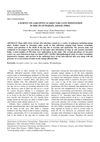124 citations,
January 2012 in “Journal of Allergy and Clinical Immunology” Endocannabinoids help control mast cell activity in human skin.
April 2024 in “Molecules/Molecules online/Molecules annual” Paris polyphylla saponins may effectively treat acne due to their antibacterial and anti-inflammatory properties.
17 citations,
April 2013 in “Experimental and Therapeutic Medicine” Anti-SSB antibodies are useful for diagnosing systemic lupus erythematosus and are linked to specific symptoms.
 25 citations,
February 2013 in “The journal of investigative dermatology/Journal of investigative dermatology”
25 citations,
February 2013 in “The journal of investigative dermatology/Journal of investigative dermatology” Blocking SCD1 in the skin with XEN103 shrinks sebaceous glands in mice.
 January 2007 in “Elsevier eBooks”
January 2007 in “Elsevier eBooks” Alopecia areata is a reversible, autoimmune-related hair loss that can have significant emotional impact and uncertain treatment effectiveness.
 April 2017 in “The journal of investigative dermatology/Journal of investigative dermatology”
April 2017 in “The journal of investigative dermatology/Journal of investigative dermatology” Stress in hair follicle cells increases certain immune-related proteins, which might contribute to hair loss conditions.
96 citations,
April 2017 in “Oncotarget” Smaller nanoemulsions can penetrate skin and hair follicles better, which may be useful for delivering drugs and vaccines through the skin.
 1 citations,
February 2017 in “International journal of anatomy and research”
1 citations,
February 2017 in “International journal of anatomy and research” Understanding fetal skin development helps diagnose congenital skin diseases.
 December 2012 in “Journal of dermatological science”
December 2012 in “Journal of dermatological science” Hair follicles help attract immune cells to minor skin injuries.
24 citations,
February 2011 in “The American journal of pathology” AIRE protein, defective in APECED patients, is found in skin and hair cells and interacts with cytokeratin 17.
2 citations,
January 2021 in “PubMed” Botulinum toxin type A may help treat hidradenitis suppurativa.
277 citations,
February 2013 in “Science Signaling” Mitochondrial reactive oxygen species are essential for skin and hair development.
 September 2022 in “Farmacja Polska”
September 2022 in “Farmacja Polska” Biotin is important for health, but taking extra usually doesn't help unless you're deficient.
20 citations,
August 2007 in “Molecular therapy” Applying a DNA vaccine to skin with active hair growth boosts immune response and protection against anthrax in mice.
 43 citations,
November 2018 in “Nature Communications”
43 citations,
November 2018 in “Nature Communications” Genetic variations affecting skin structure play a key role in severe acne.
 April 2024 in “Exploratory Animal and Medical Research”
April 2024 in “Exploratory Animal and Medical Research” Sarcoptes mites cause severe skin issues in dogs, which can be fatal if untreated.
 3 citations,
April 2019 in “The journal of investigative dermatology/Journal of investigative dermatology”
3 citations,
April 2019 in “The journal of investigative dermatology/Journal of investigative dermatology” ILC1 cells contribute to hair loss in alopecia areata.
 48 citations,
April 2010 in “Journal of the European Academy of Dermatology and Venereology”
48 citations,
April 2010 in “Journal of the European Academy of Dermatology and Venereology” Men are more likely to get infectious skin diseases, while women are more prone to autoimmune and pigment-related skin conditions, influenced by biological and environmental factors.
 February 2024 in “Buletin Veteriner Udayana”
February 2024 in “Buletin Veteriner Udayana” Using sulfur soap helped improve skin problems in a dog with demodecosis.
 16 citations,
January 2019 in “Skin appendage disorders”
16 citations,
January 2019 in “Skin appendage disorders” Intralesional corticosteroids work best for mild alopecia areata, and DPCP works best for moderate to severe cases.
 14 citations,
January 2017 in “Skin appendage disorders”
14 citations,
January 2017 in “Skin appendage disorders” Simvastatin/ezetimibe did not effectively treat severe alopecia areata and caused side effects in some patients.

Seborrheic dermatitis and dandruff are often treated with antifungal and anti-inflammatory medications, which can reduce symptoms and yeast growth on the scalp.
 October 2023 in “bioRxiv (Cold Spring Harbor Laboratory)”
October 2023 in “bioRxiv (Cold Spring Harbor Laboratory)” Early regulatory T cells are crucial for normal skin pigmentation.
 7 citations,
July 2019 in “International archives of internal medicine”
7 citations,
July 2019 in “International archives of internal medicine” Common skin conditions can greatly affect a person's mental health and social life.
12 citations,
September 2000 in “Journal of the European Academy of Dermatology and Venereology” Balneophototherapy effectively treats ichthyosis linearis circumflexa but may need ongoing treatment due to short remission.
 April 2012 in “Journal of the American Academy of Dermatology”
April 2012 in “Journal of the American Academy of Dermatology” Clofazimine successfully treated a man's ashy dermatosis, clearing his skin lesions.
 82 citations,
June 2020 in “Inflammation Research”
82 citations,
June 2020 in “Inflammation Research” Skin problems in COVID-19 patients are rare and may be due to the body's complex immune response or blood clotting issues.

Dupilumab helped improve skin and prevent new lesions in a child with a rare immune disorder and severe eczema.
 April 2021 in “Journal of Investigative Dermatology”
April 2021 in “Journal of Investigative Dermatology” People with atopic dermatitis have more CD4+ T cells that respond to a certain bacterial lipid, which may play a role in the skin condition's inflammation.
 November 2021 in “Egyptian Journal of Medical Microbiology”
November 2021 in “Egyptian Journal of Medical Microbiology” COVID-19 protective measures led to skin irritation, hair loss, and brittle nails; using skin-friendly products and a healthy diet is recommended.




















